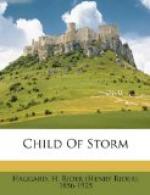“Cetewayo has behaved ill,” he said at length; “and before a white man, who will report the matter, which makes it worse. He has no right to dictate to me to whom I shall or shall not give my daughters in marriage. Moreover, I have spoken; nor do I change my word because he threatens me. It is known throughout the land that I never change my word; and the white men know it also, do they not, O Macumazana?”
I answered yes, they did. Also, this was true, for, like most weak men, Panda was very obstinate, and honest, too, in his own fashion.
He waved his hand, to show that the subject was ended, then bade Umbelazi go to the gate and send a messenger to bring in “the son of Matiwane.”
Presently Saduko arrived, looking very stately and composed as he lifted his right hand and gave Panda the “Bayete”—the royal salute.
“Be seated,” said the King. “I have words for your ear.”
Thereon, with the most perfect grace, without hurrying and without undue delay, Saduko crouched himself down upon his knees, with one of his elbows resting on the ground, as only a native knows how to do without looking absurd, and waited.
“Son of Matiwane,” said the King, “I have heard all the story of how, with a small company, you destroyed Bangu and most of the men of the Amakoba, and ate up their cattle every one.”
“Your pardon, Black One,” interrupted Saduko. “I am but a boy, I did nothing. It was Macumazahn, Watcher-by-Night, who sits yonder. His wisdom taught me how to snare the Amakoba, after they were decoyed from their mountain, and it was Tshoza, my uncle, who loosed the cattle from the kraals. I say that I did nothing, except to strike a blow or two with a spear when I must, just as a baboon throws stones at those who would steal its young.”
“I am glad to see that you are no boaster, Saduko,” said Panda. “Would that more of the Zulus were like you in that matter, for then I must not listen to so many loud songs about little things. At least, Bangu was killed and his proud tribe humbled, and, for reasons of state, I am glad that this happened without my moving a regiment or being mixed up with the business, for I tell you that there are some of my family who loved Bangu. But I—I loved your father, Matiwane, whom Bangu butchered, for we were brought up together as boys—yes, and served together in the same regiment, the Amawombe, when the Wild One, my brother, ruled” (he meant Chaka, for among the Zulus the names of dead kings are hlonipa—that is, they must not be spoken if it can be avoided). “Therefore,” went on Panda, “for this reason, and for others, I am glad that Bangu has been punished, and that, although vengeance has crawled after him like a footsore bull, at length he has been tossed with its horns and crushed with its knees.”
“Yebo, Ngonyama!” (Yes, O Lion!) said Saduko.
“Now, Saduko,” went on Panda, “because you are your father’s son, and because you have shown yourself a man, although you are still little in the land, I am minded to advance you. Therefore I give to you the chieftainship over those who remain of the Amakoba and over all of the Amangwane blood whom you can gather.”




